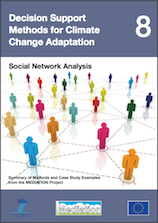Social Network Analysis

Introduction
There is increasing policy interest in the appraisal of options, as adaptation moves from theory to practice. At the same time, it is recognised that the appraisal of climate change adaptation involves a number of major challenges, particularly the consideration of uncertainty. In response, a number of existing and new decision support tools are being considered for adaptation.
This Policy Briefing Note (Note 8) (download from the right-hand column) provides a description of Social Network Analysis. It then places SNA in the context of adaptation and identifies strengths and weaknesses. Two case studies from MEDIATION highlight issues in applying the tool to real decision processes. More detailed information is available in MEDIATION deliverables, and sources and links on the MEDIATION Adaptation Platform.
Key Messages
- There is increasing interest in the appraisal of options, as adaptation moves from theory to practice. In response, a number of existing and new tools are being developed. The MEDIATION project has considered the strengths and weakness of various approaches and tools for adaptation, including methods that address various sources of uncertainty in making a decision.
- The FP7 MEDIATION project has undertaken a detailed review of these tools, and has tested them in a series of case studies. It has assessed their applicability for adaptation and analysed how they consider uncertainty. The findings have been used to provide information and guidance for the MEDIATION Adaptation Platform and are summarised in a set of technical policy briefing notes.
- The main strength of SNA is that it provides a formalised method to visualise stakeholder and knowledge networks, and in doing so, to understand them in the context of future action. It provides information on institutional actors and relationships, their decision framing, and the influence and exchange of information for progressing adaptation and overcoming barriers. It can also relate these to qualitative metrics and use these to benchmark progress towards outcomes. Qualitative SNA is quick and relatively easy to do and encourages participation across diverse viewpoints and actors. Quantitative SNA extends to provide correlations on key variables to further understanding.
- Social Network Analysis (SNA) analyses social networks and institutional actors (organizations, individuals, interest groups, etc.) and their linkages (socio-institutional relationships), mapping the influence and the exchange of information to assess adaptive capacity.
- SNA explores socio-institutional processes, and identifies the context and governance around decisions. It highlights institutional arrangements and structures, the decision framing of actors, their approach to dealing with information (confidence and uncertainty), the competence for action, and the laws, regulations, values and norms that are likely to guide decisions.
- The approach has high relevance for adaptation. It builds on the growing consensus that adaptation is a process, i.e. that implementing adaptation involves more than a set of technical options. There are important barriers to adaptation that are part of existing socio-institutional processes and these can be revealed and subsequently negotiated through SNA. It can also investigate the evaluation of uncertainty, i.e. how decisions are framed and subsequent choice of appraisal tools.
- The potential weaknesses involve the subjective bias, including participation bias for qualitative SNA, and the high survey size and time needed for quantitative SNA. Previous applications of SNA for adaptation have been reviewed, and Mediation case study applications are summarised.
- The review and case studies provide useful information on the range of adaptation problem types where SNA might be appropriate, as well as data needs, resource requirements and good practice lessons. The approach has wide applicability and is considered useful for adaptation planning and the links to choices of tools. Good practice suggestions are included, such as the need for balanced representation in qualitative SNA, and the need for high sample sizes for quantitative SNA.
Suggested Citation
Bharwani, S., Downing, T.E., Varela-Ortega, C., Blanco, I., Esteve, P., Carmona, G., Taylor R., Devisscher, T., Coll Besa, M. Tainio, A., Ballard, D. and Watkiss, P. (2013). Social Network Analysis: Decision Support Methods for Adaptation, MEDIATION Project, Briefing Note 8.
The research leading to these results has received funding from the European Community’s Seventh Framework Programme (FP7/2007-2013) under grant agreement no. 244012.
- Mediation Adaptation Pathfinder
- Learn more about the MEDIATION project
- Social Network Analysis Training Module
- View a complete list of Mediation Technical Briefs
Suggested Citation
Bharwani, S., Downing, T.E., Varela-Ortega, C., Blanco, I., Esteve, P., Carmona, G., Taylor R., Devisscher, T., Coll Besa, M. Tainio, A., Ballard, D. and Watkiss, P. (2013). Social Network Analysis: Decision Support Methods for Adaptation, MEDIATION Project, Briefing Note 8.
(0) Comments
There is no content